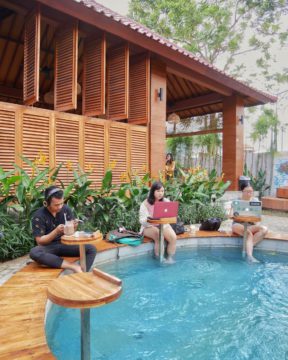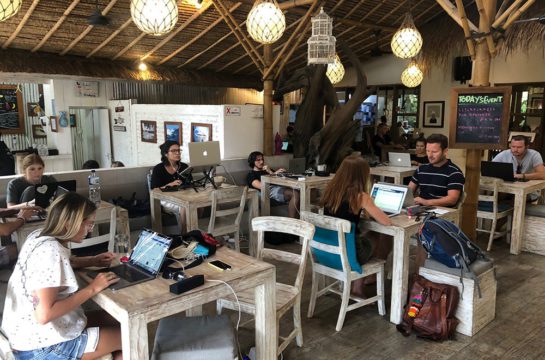An online petition has been launched by Wahyu Taufiq, an online entrepreneur and Founder of DIGIKREF, calling on President Joko Widodo and his cabinet to create a nomad-style visa to facilitate the large and growing community of Digital Nomads who earn their livelihoods online with Internet technologies.

Digital Nomads are frequently seen sitting with their laptops and other devices in coffee shops, co-working spaces, or at any location with wireless Internet capabilities. A growing sector of the global workforce, Digital Nomads, can be wealthy or aspiring entrepreneurs, the retired or semi-retired, and remote workers shielding from COVID-19 by avoiding traditional office settings.
Digital Nomads in Bali are a large and semi-visible group who will often flock to global locations with good climates, a pleasant living situation, affordable quality housing, and the availability of visas that allow them to live and operate in foreign locales peacefully.
Wahyu Taufiq is an Indonesian working with the social media agency Olúmidé Gbenro and the founder of a non-profit group in which international digital nomads in Bali share knowledge with Indonesian students. Interviewed by Lonely Planet, Taufiq told how he sees that if the Indonesian Government facilitated digital Nomads in their desire to work and live in Bali and other parts of Indonesia, benefits would accrue to both the Nomads and locals. The new visa class, he believes, would help make Bali a digital hub and assist the Island to diversify its economy and reduce its current over-dependence on tourism.
A well-argued preface to an online petition was addressed to Indonesia’s national leadership and posted on Change.org , where Taufiq states that Bali requires drastic measures to can return to economic health.
Wahyu said his goal is to achieve 10,000 signatures on the online petition. By mid-day on Sunday, 13 September 2020, more than 2,100 had signed their support to the petition drive.
Reminding National leaders that Indonesia has declared its intent to boost its digital and creative economy by becoming a Southeast Asia Digital Hub, Taufiq points to official moves to provide digital industry financing; put in place fair tax policies; protect digital consumers; regulate e-commerce operators; and develop the IT and communication infrastructure.
The IT innovator estimates that the Digital Nomad class globally numbers 4.8 million people, a number growing dramatically during the current coronavirus pandemic. Moreover, he cites a survey published by the Digital Nomad Summit that claims 80% of Digital Nomads participating in the Summit said they planned to spend time in Bali during 2020-2021. Another survey from the same source said that 64% of those responding said they would be happy to pay taxes in Indonesia in return for legal visa status.
Working and sharing their know-how with local Indonesians, Digital Nomads are searching for a “lifestyle” that can substantially impact the local economy in terms of expenditures on food, accommodation, transportation, and local travel.
When tourism visitors will return to Bali and in what number are subjects of widely varying speculation in Bali. What’s clear, Bali is in urgent need of new markets to revive the local economy, and the millions of Digital Nomads now looking for a place to stay and work online could represent at least a partial answer to Bali’s prayers for a new market of inbound visitors.
Related Sites
Lonely Planet: Digital nomads push for a new visa to work in Bali
Petition to Indonesian Government to Create Visa for Digital Nomads








